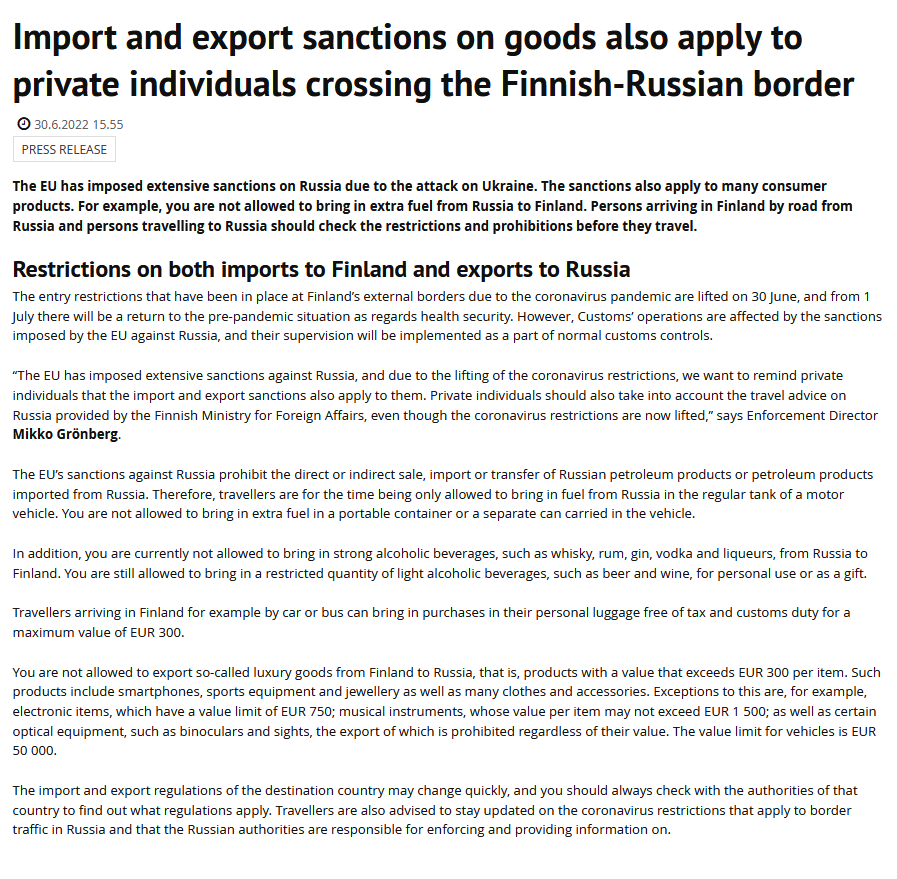In today's #vatnik soup I'll talk about sanctions and business in Russia. Most of the data and discussion points come from recently published work titled "Less than Nine Percent of Western Firms Have Divested from Russia" by Evenett & Pisani.
1/17
1/17

In my previous soup, I have written how the Western sanctions are circumvented in Russia. The most common method for this is using third party countries for importing products. Especially Eurasian countries such as Kazakhstan are common import points for Western products.
2/17
2/17

Russia has also made "parallel import" legal, which means that almost any product can be imported to Russia without the permission of the trademark owner. The problem with this is that these products have no guarantee.
3/17
3/17

But most companies don't even have to resort to this type of tactics - they simply continued business in Russia as usual. The study looked at around 1400 companies whose headquarters are located in the G7 or in the EU. Out of these, only 8,5% have actually left Russia.
4/17
4/17

One of the authors, Evenett, commented that this type of voluntary actions to leave a market often work poorly, and that similar results were observed in South Africa during the apartheid. The sole purpose of many companies is to make money without moral judgment.
5/17
5/17

Also, Putin's regime hasn't made the leaving easy. If the company wants to sell their production lines, factories, warehouses, etc., they'll have to find a buyer who's prepared to pay a high enough price.
6/17
6/17

The time span for this payment can range from one to two years, and the Russian government can also obstruct these sales or even prevent transfer of proceeds abroad, making these deals extremely challenging and time-consuming.
7/17
7/17
But many companies have probably decided to stay simply out of greed: when most of your competitors leave the market, business can be extremely lucrative. These companies and their owners don't care about filling the Russian war coffin, they just want to make an easy buck.
8/17
8/17

Some well-known companies that are continuing business-as-usual in Russia are Benetton (Italy), Clarins (France), Lacoste (France), Match Group (US), Raiffeisen Bank International (Austria) and Liebherr (Switzerland).
9/17



9/17




Many companies, like the Austrian Red Bull GmbH, have also "suspended new investments" in Russia, which for most consumer products means business-as-usual, as they didn't even have any production capabilities in Russia and are focusing solely on the wholesale market.
10/17
10/17

Yale University has published similar studies, and they have a website where people can check whether a company still has activity in Russia. They use a categorization of four distinct categories: "stay," "wait," "leave," and "exited".
som.yale.edu/story/2022/ove…
11/17
som.yale.edu/story/2022/ove…
11/17
Some countries that have over representation among the companies that remained, include Germany, Italy and Cyprus. 250 German companies remain in Russia. For the Cypriot companies, this number is 211, for the US 159, for Japan 90 and for Italy 81.
12/17
12/17

Only 14 German and 9 French companies have exited the Russian market. A total of 15 companies from Finland have left Russia, and most of the rest are in the process of leaving, but Russian authorities are making this exceedingly difficult.
13/17
13/17
Finland has also stopped admitting tourist visas to Russians, which has led to an interesting scheme that involves Norway and the Schengen agreement. Groups of cars from Russia arrive to Näätämö, Northern Finland via the Storskog border station in Norway to buy tax-free...
14/17
14/17
... groceries and so-called luxury products from Finland. The Schengen agreement allows them to come from Norway to Finland freely. One of the local stores in Näätämö stopped selling products tax-free already in Spring, 2022, but another store sells them as usual.
15/17
15/17

The store owner has stated that the responsibility falls on the state, not on him. Since these tax free purchases can't exceed 300 EUR, the Russians have recruited "babushka mules" ("kilomummo" in Finnish) to cross the border and buy more products for them.
16/17
16/17

These "babushkas" also get around 20 EUR shopping money for themselves. The most commonly bought products are chocolate, cheese, coffee, children's clothing, vitamins and Kuoma winter boots. These products are then often sold online or in stores for a hefty profit.
17/17
17/17
Sources:
dx.doi.org/10.2139/ssrn.4…
yle.fi/a/74-20017202
Support my work (and get some AI art!): buymeacoffee.com/PKallioniemi
Past soups: vatniksoup.com
Related soups:
Sanctions:
dx.doi.org/10.2139/ssrn.4…
yle.fi/a/74-20017202
Support my work (and get some AI art!): buymeacoffee.com/PKallioniemi
Past soups: vatniksoup.com
Related soups:
Sanctions:
https://twitter.com/P_Kallioniemi/status/1596061798377336832
Addendum: Japan has also sanctioned Russia, as has Kosovo.
• • •
Missing some Tweet in this thread? You can try to
force a refresh

































